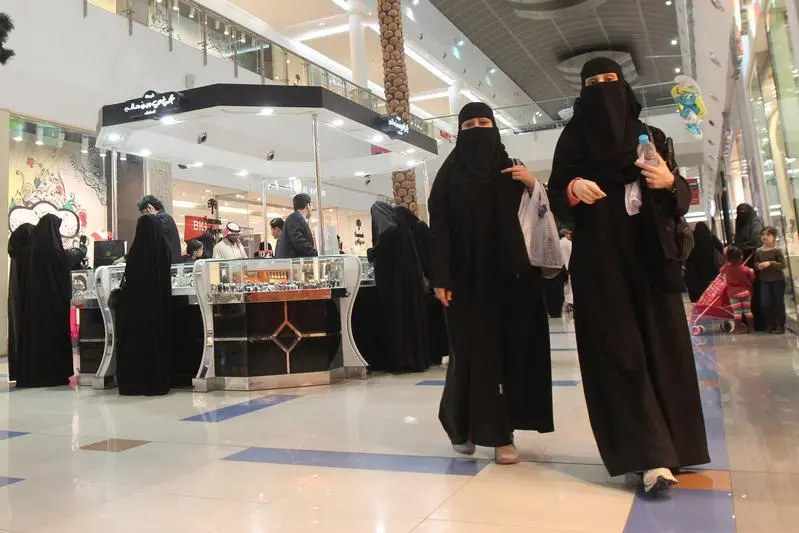PHOTO
15 December 2016
By Lulwa Shalhoub
JEDDAH: A year ago, more than 130,000 Saudi women out of 1.48 million eligible citizens registered to vote for the first time in municipal elections for 6,917 candidates, 979 of them women.
Hopes and expectations were raised as history was being made in the Kingdom, with Saudi women celebrating and exercising their long-awaited right to elect and get elected, and hence to participate in their country’s politics. One year on, the experience has been one of success, obstacles and disappointment.
“I’m convinced that if men are able to express their views, so are women,” said elected Qatif Municipal Council member Khadra Al-Mubarak. “If men have the right to propose project ideas and work to accomplish them, so do women.”
The concept of elections is new to Saudi society, especially to women. Last December marked the first electoral experience for women, while 2005 was the first for men. Only 17 women were elected, while 21 were appointed across the Kingdom.
“I believe that it’s an essential step toward gaining more rights,” said Hatoon Al-Fassi, general coordinator of the Baladi Initiative, which was involved in training female candidates and voters ahead of the elections.
She said women are responsible for creating the image they want to reflect through their work.
“Whether women’s involvement has been superficial or not depends on the members themselves and on the free space they’re given to work,” said Al-Fassi, who is a Saudi writer and a visiting professor at Qatar University.
Two-thirds of members were elected, while a third were appointed in 284 municipal councils across the country. Women formed only 14 percent of total candidates.
Achievements and challenges
Upon being elected and appointed, the 38 women members across the Kingdom started holding meetings with their male counterparts to discuss projects in their areas.
Some are allowed to sit at the same table, while others communicate solely via a televised circuit.
This has created frustration and anger among some, which drove elected member Lama Al-Sulaiman to resign. When contacted by Arab News, she declined to comment about her experience.
“This issue has shifted focus from political efforts and national participation to the inability of dealing with women; that a man can’t stand having a woman sitting at the same table of decision-makers,” said Al-Fassi. “Some men feel the decisions that women take could threaten them. This is pure sexism.”
Qatif Municipal Council member Al-Mubarak’s experience is different. She has completed a number of environmental projects in collaboration with her male colleagues without facing any communication hurdles.
“When you sit directly with other members, propose ideas and discuss them, the outcome and interaction will surely be faster than communicating in two different rooms,” she said.
To Al-Mubarak, being a woman in the council is like having a new channel through which women in society can deliver their concerns and complaints.
She said her male colleagues are welcoming and cooperate productively with her and her proposed projects.
“There’s no such thing as women’s work and men’s work. Tasks aren’t divided by gender,” she said.
“Work should focus on developmental activities for everyone. Half of society was out of the picture when it comes to development in society. It has been a suitable work environment and fertile soil to accomplish many projects.”
Al-Mubarak aims to integrate disabled people into society and help them be independent in their day-to-day lives outside their homes.
“I want to help make government buildings and general facilities accessible to people with special needs,” she said.
Municipal councils act as advisory boards that monitor and evaluate municipal services before coming up with recommendations and proposals.
Proposals are approved by executive bodies such as the municipality or ministries in charge before being implemented.
“This bureaucracy delays executing projects,” said Al-Mubarak. “Some officials at the municipality look at councils as a burden, and this is an obstacle in the way of completing projects. Both bodies need each other to accomplish.”
Being segregated from men at municipal council meetings is among the challenges facing the only remaining female councilor in Jeddah, Rasha Hefzi. “This has been a challenge for me and has affected the pace at which work is done,” she said.
Hefzi is in charge of major districts in west Jeddah that are home to about 900,000 citizens. She worked on a project to improve the efficiency of the 940 municipal services hotline, which receives calls reporting the need to close excavations or holes in the streets, which is a common problem in the city.
She also started a neighborhood council initiative to emphasize communication between the municipal council and residents of the area she is in charge of.
“The neighborhood council oversees the districts and coordinates with me in order to stay informed of the services these districts need. This helps accelerate responding to the needs of these districts,” she said.
Masouma Al-Reda, one of two elected female municipal council members in Al-Ahsa, devoted this year to empowering women who are skilled in handicrafts.
She worked on setting up markets around the houses of families that produce products and handcrafts at home.
“Al-Ahsa is known for its innovative and productive women who work from home. I worked on offering them the appropriate space to allow them the chance to enhance their work,” said Al-Reda, who is also an active family affairs consultant.
She and her colleague communicated with their counterparts via televised circuit. “I can’t generalize, but from my experience, Al-Ahsa, men are very supportive of women and work with us hand in hand without discriminating or marginalizing us,” she told Arab News.
“I’ve worked very hard to change the shallow stereotypes of the municipal elections being simply superficial.”
Future aspirations
The three councilors Arab News spoke to reiterated that this first round has set solid grounds for women’s participation in future rounds.
“I advise future candidates to inform themselves and start being active in municipal work early so they’ll be more productive,” said Hefzi, who has been involved in municipal work in Jeddah since 2007.
Al-Reda says she strives to set an example to young women to whom she teaches Arabic at school.
One of her students now leads a group of girls who promote the culture of volunteer work in society.
Al-Reda said her activism existed long before the elections, but being at the municipal council has enabled her to achieve more.
“I want women in the next rounds to be eager to participate and not be repelled by the negative stereotype,” she said.
“There’s a lot that can be done, and like any project there are achievements and failures. We should focus on the positivity in the experience.”
Al-Mubarak encourages a more positive attitude when looking at women’s experiences during this round.
“It has been a wonderful experience so far and extremely fruitful, unlike what has been said that it was symbolic or superficial,” she said.
“Women are in charge of changing that image. They have to be accomplished and productive.”
Al-Fassi said because the number of women members was small in the last round, the impact has been limited.
However, “I believe that women will be better aware in the next rounds and will have more demands for real participation rather than a superficial one, so they’ll be more influential.”
By Lulwa Shalhoub
JEDDAH: A year ago, more than 130,000 Saudi women out of 1.48 million eligible citizens registered to vote for the first time in municipal elections for 6,917 candidates, 979 of them women.
Hopes and expectations were raised as history was being made in the Kingdom, with Saudi women celebrating and exercising their long-awaited right to elect and get elected, and hence to participate in their country’s politics. One year on, the experience has been one of success, obstacles and disappointment.
“I’m convinced that if men are able to express their views, so are women,” said elected Qatif Municipal Council member Khadra Al-Mubarak. “If men have the right to propose project ideas and work to accomplish them, so do women.”
The concept of elections is new to Saudi society, especially to women. Last December marked the first electoral experience for women, while 2005 was the first for men. Only 17 women were elected, while 21 were appointed across the Kingdom.
“I believe that it’s an essential step toward gaining more rights,” said Hatoon Al-Fassi, general coordinator of the Baladi Initiative, which was involved in training female candidates and voters ahead of the elections.
She said women are responsible for creating the image they want to reflect through their work.
“Whether women’s involvement has been superficial or not depends on the members themselves and on the free space they’re given to work,” said Al-Fassi, who is a Saudi writer and a visiting professor at Qatar University.
Two-thirds of members were elected, while a third were appointed in 284 municipal councils across the country. Women formed only 14 percent of total candidates.
Achievements and challenges
Upon being elected and appointed, the 38 women members across the Kingdom started holding meetings with their male counterparts to discuss projects in their areas.
Some are allowed to sit at the same table, while others communicate solely via a televised circuit.
This has created frustration and anger among some, which drove elected member Lama Al-Sulaiman to resign. When contacted by Arab News, she declined to comment about her experience.
“This issue has shifted focus from political efforts and national participation to the inability of dealing with women; that a man can’t stand having a woman sitting at the same table of decision-makers,” said Al-Fassi. “Some men feel the decisions that women take could threaten them. This is pure sexism.”
Qatif Municipal Council member Al-Mubarak’s experience is different. She has completed a number of environmental projects in collaboration with her male colleagues without facing any communication hurdles.
“When you sit directly with other members, propose ideas and discuss them, the outcome and interaction will surely be faster than communicating in two different rooms,” she said.
To Al-Mubarak, being a woman in the council is like having a new channel through which women in society can deliver their concerns and complaints.
She said her male colleagues are welcoming and cooperate productively with her and her proposed projects.
“There’s no such thing as women’s work and men’s work. Tasks aren’t divided by gender,” she said.
“Work should focus on developmental activities for everyone. Half of society was out of the picture when it comes to development in society. It has been a suitable work environment and fertile soil to accomplish many projects.”
Al-Mubarak aims to integrate disabled people into society and help them be independent in their day-to-day lives outside their homes.
“I want to help make government buildings and general facilities accessible to people with special needs,” she said.
Municipal councils act as advisory boards that monitor and evaluate municipal services before coming up with recommendations and proposals.
Proposals are approved by executive bodies such as the municipality or ministries in charge before being implemented.
“This bureaucracy delays executing projects,” said Al-Mubarak. “Some officials at the municipality look at councils as a burden, and this is an obstacle in the way of completing projects. Both bodies need each other to accomplish.”
Being segregated from men at municipal council meetings is among the challenges facing the only remaining female councilor in Jeddah, Rasha Hefzi. “This has been a challenge for me and has affected the pace at which work is done,” she said.
Hefzi is in charge of major districts in west Jeddah that are home to about 900,000 citizens. She worked on a project to improve the efficiency of the 940 municipal services hotline, which receives calls reporting the need to close excavations or holes in the streets, which is a common problem in the city.
She also started a neighborhood council initiative to emphasize communication between the municipal council and residents of the area she is in charge of.
“The neighborhood council oversees the districts and coordinates with me in order to stay informed of the services these districts need. This helps accelerate responding to the needs of these districts,” she said.
Masouma Al-Reda, one of two elected female municipal council members in Al-Ahsa, devoted this year to empowering women who are skilled in handicrafts.
She worked on setting up markets around the houses of families that produce products and handcrafts at home.
“Al-Ahsa is known for its innovative and productive women who work from home. I worked on offering them the appropriate space to allow them the chance to enhance their work,” said Al-Reda, who is also an active family affairs consultant.
She and her colleague communicated with their counterparts via televised circuit. “I can’t generalize, but from my experience, Al-Ahsa, men are very supportive of women and work with us hand in hand without discriminating or marginalizing us,” she told Arab News.
“I’ve worked very hard to change the shallow stereotypes of the municipal elections being simply superficial.”
Future aspirations
The three councilors Arab News spoke to reiterated that this first round has set solid grounds for women’s participation in future rounds.
“I advise future candidates to inform themselves and start being active in municipal work early so they’ll be more productive,” said Hefzi, who has been involved in municipal work in Jeddah since 2007.
Al-Reda says she strives to set an example to young women to whom she teaches Arabic at school.
One of her students now leads a group of girls who promote the culture of volunteer work in society.
Al-Reda said her activism existed long before the elections, but being at the municipal council has enabled her to achieve more.
“I want women in the next rounds to be eager to participate and not be repelled by the negative stereotype,” she said.
“There’s a lot that can be done, and like any project there are achievements and failures. We should focus on the positivity in the experience.”
Al-Mubarak encourages a more positive attitude when looking at women’s experiences during this round.
“It has been a wonderful experience so far and extremely fruitful, unlike what has been said that it was symbolic or superficial,” she said.
“Women are in charge of changing that image. They have to be accomplished and productive.”
Al-Fassi said because the number of women members was small in the last round, the impact has been limited.
However, “I believe that women will be better aware in the next rounds and will have more demands for real participation rather than a superficial one, so they’ll be more influential.”
© Arab News 2016





















